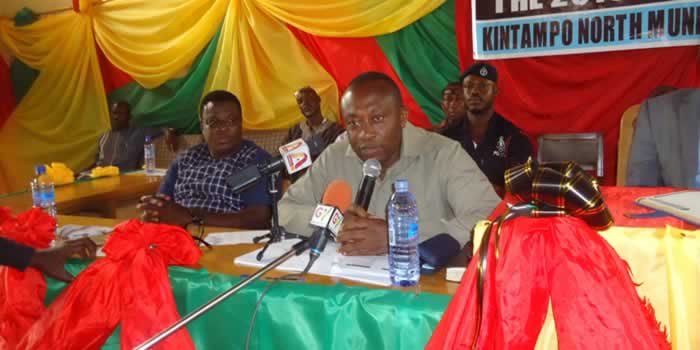Adverts
SECURITY
Kintampo MCE appeals for withdrawal of security from Portor
Mr. Michael Sarkodie Baffoe, the Municipal Chief Executive (MCE) for Kintampo North has appealed to the Brong Ahafo Regional Minister and Regional Security Committee (RESEC) to consider withdrawal of security agencies detailed at Portor due to violent clashes between Fulani herdsmen and Konkonba settler farmers in the Municipality in September 2017, since the place is relatively calm and peaceful now.

Date Created : 9/7/2018 4:48:57 AM : Story Author : Imoro Ayibani/Ghanadistricts.com
He said the withdrawal could be done gradually so that the Municipal Security Committee (MUSEC) would continue to monitor the situation. He noted that the military have already been withdrawn from the area to enable the people go on with their normal activities.
The MCE made this known at a Town Hall Meeting in Kintampo organized by the Ministry of Information (MOI) and the Information Services Department (ISD) in collaboration with the Ministry of Local Government and Rural Development to explain government policies and programmes to the people.
He said expenditure of the security at Portor and other flashpoint areas/communities have over stressed the Assembly meager resources. “Fuelling and feeding them has not been easy”, he said. He added that the assembly resources meant for development has been diverted to maintain peace and security due to Portor problem and recently Kawampe.
Cross-section of chiefs at the meeting
In September 2017, more than 10 people were killed and others injured in about two weeks violent clashes between Fulani herdsmen and Konkonba settler farmers in the Municipality. The deaths occurred during attacks and reprisal attacks over the alleged destruction of farms by cattle belonging to the herdsmen. The trouble communities were Jatokura, Kawampe, Yawbofourkura, Dawadawa and Kadelso
On the Tamale road, the MCE said the Assembly is responsible for fuelling and feeding Police Special Weapons and Tactics unit (SWAT), Anti-terrorist unit, Operation Vanguards and National Patrol Police team who operates on the highway and that was a drain to the Assembly coffers. He added that even though government have been supporting the Assembly a lot, they have challenges with Chieftaincy conflicts.
The MCE also noted that because of the location of Kintampo and its link between the North and South, anytime there is an accident on the highways, the people and the ambulance services rely on the Assembly for support.
The MCE reiterated his support to the Police when he assumes office as MCE, he realized that the Police needed resources to work effectively. As such, he maintains their vehicle for them by fixing new engine for their pick-up. He noted this was to enable them (the Police) fight crime in the municipality to ensure proactive policing to smoke out criminals. He said street lights was also provided to improve security in the municipality.
Mr. Imoro Ayibani Tebra, the Regional Information Officer speaking at the meeting
Mr. Imoro Ayibani Tebra, the Regional Information Officer explained that Town hall meeting is one of the tools used to deepen and ensure participatory democracy which was an element of good governance. Mr. Imoro noted that Stakeholder consultation, participation, collective decision making and accountability are the main pillars on which decentralization thrives.
He added government believes in an all-inclusive governance system and is using the Town Hall Meetings as a central part of its governance machinery to offer accountability and transparency to the people. He called on the people to actively participate in the discussion devoid of politics and chieftaincy issues.
The Sunyani Municipal Information Officer, Desmond Tutu took was also on hand to brief the gathering on government flagship programs such as Planting for Food and Jobs, Free SHS, Planting for cash and development and NABCO. He also explained the double track system in the SHS among others.
In attendance were chiefs, the Assembly members, the security services, political parties, CSOs, students, heads of decentralized departments and the media.


 facebook
facebook twitter
twitter Youtube
Youtube TOLL FREE 0800 430 430
TOLL FREE 0800 430 430 +233 593 831 280
+233 593 831 280 GPS: GE-231-4383
GPS: GE-231-4383 info@ghanadistricts.com
info@ghanadistricts.com Box GP1044, Accra, Ghana
Box GP1044, Accra, Ghana